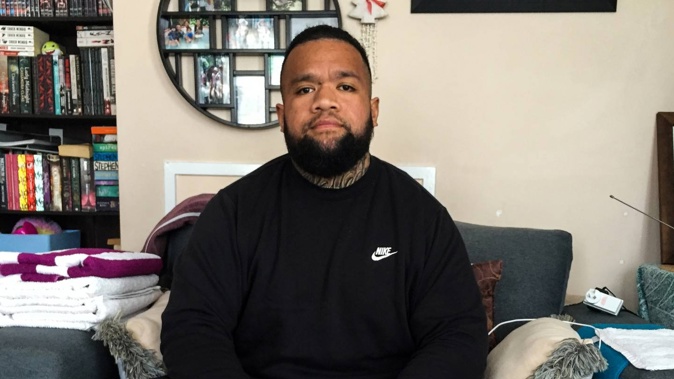
An aspiring musician caught red-handed with nearly 20kg of meth inside Auckland International Airport during New Zealand’s strictest Covid-19 lockdown has been sentenced to seven years and three months in jail.
Romney Fukofuka appeared in the Manukau District Court this morning to be sentenced after pleading guilty to the failed importation, as well as attempting to import another 15kg of methamphetamine, and offering to supply the Class-A drug.
Lawyer for the Crown Benjamin Mugisho said Fukofuka played a “leading role” in the offending, and he was effectively a partner in the Auckland side of the operation.
Mugisho told the courtroom his culpability went beyond the meth imported on his overseas trip, as drugs were sent to addresses linked to him and he tracked those packages from his phone.
As well as this, he said there were clear messages showing he intended to use it in a commercial enterprise and expected financial gain.
While the Crown acknowledged he had some form of addiction, Mugisho said it was not clear that this had led to his offending.
He said there was clearly a “particular lifestyle he wanted to live”.
Fukofuka’s lawyer, Jasper Rhodes, said just because the Crown had been unable to identify the leaders did not mean Fukofuka was in charge.
He told the court his client did not have operational control and was a “catcher”, not the person calling the shots.
“It is clear in the text messages it [the leader] is not him”
He said Fukofuka was “essentially caught holding the baby”, and the higher starting points should be reserved for people at the top of the chain.
“The landscape has changed and we’re now speaking about hundreds of kilos regularly.”
Fukofuka was given a starting point of 16 years imprisonment by Judge Yelena Yelavich who said his offending overall can be described at the high end of significant.
“While I accept you had an addiction, it is evident you were motivated by commercial gain.”
A 20 per cent reduction was given due to his guilty plea, 15 per cent for background factors including drug and alcohol abuse from a young age and another 15 per cent for his rehabilitative work so far.
On top of the 50 per cent discount, he was given a further 12-month reduction for time spent on electronic bail, therefore his final sentence is seven years and three months in prison.
The botched smuggling
Better known as the RnB singer Konecs, Fukofuka was arrested on May 7, 2020 after returning to New Zealand from a five-day visit to the United States, during a time of tight travel restrictions because of the pandemic.
Such a quick trip during a global pandemic was always going to raise a red flag for suspicious border control officials, although Fukofuka’s bungled attempt at smuggling was not as reckless as it seems.
He had inside help.
The investigation led by Customs, codenamed Operation Santana, also uncovered a ring of corrupt Air New Zealand baggage handlers working at the airport.
They were supposed to remove Fukofuka’s suitcase from the airport before it could be screened, and might have remained undetected except that Fukofuka - high on meth and in a state of heightened paranoia - didn’t stick to the plan.
“I panicked. I made a mistake,” Fukofuka told the Herald in an exclusive interview in September.
“But I’m glad I was caught because the way I was going I would have probably ended up killing someone.”
Born in American Samoa in November 1994, Romney Fuki Fukofuka was raised in Māngere, between the Manukau Harbour and Auckland airport.
He was the middle of seven children born to Tongan migrants and went to Māngere College, where he says he was bullied and kicked out at 16 for fighting.
Fukofuka found a sense of belonging in the Windrush Close Boys, or WCB, a group of teenagers from the same street who banded together.
The WBC was one of many so-called “ABC gangs” - because they had names that could be abbreviated to three letters - that emerged in South Auckland in the mid-2000s.
Eventually, Fukofuka was introduced to smoking methamphetamine and became addicted.
He was smoking meth every single day; to stay high and avoid the “comedown”, as well as maintain the energy Fukofuka thought he needed to succeed in the music industry.
/cloudfront-ap-southeast-2.images.arcpublishing.com/nzme/T36C2UXK5ENB6SCMCLI2FZSBGI.jpg)
Konecs, aka Romney Fukofuka, was an aspiring musician who released a number of music videos online. Image / YouTube
Performing under the stage name Konecs, the RnB musician started to make a name for himself singing in clubs around Auckland, which led to gigs in Australia and the United States.
He tried to quit but the temptation to start using drugs again to kickstart his creativity became overwhelming, especially as everyone in his social circles was looking to get high, too.
“I was feeling good but everyone around me was always asking me ‘do you know someone?’ One night, I took them to see my old mates and they gave us heaps of stuff,” Fukofuka said previously.
“I told myself ‘I’ll just sell it’. I won’t use it, I’ll just sell it. So I was making money but I just kept thinking about [using].”
“I was going for gold eh. I didn’t care who was affected, I was just putting myself first.”
At 25, Fukofuka was smoking thousands of dollars worth of meth every day and selling more and more to support his expensive habit.
That’s when he realised he could tap into his own contacts overseas, rather than relying on local suppliers, to establish his own meth pipeline into New Zealand.
In January 2020, Fukofuka flew to Los Angeles to meet someone he knew in the music scene from previously performing at nightclubs.
He is careful to not identify anyone - the criminal code of silence means “narking” is frowned upon - but explains how he convinced organised criminals in the US to work with him.
“I just knew this one person. He was a nobody but he knew all the right people. They were looking for a connection in New Zealand and I was high, and when I’m high I act like I know what I’m doing.”
He said New Zealand’s reputation as a small but profitable drug market was well known.
A kilogram of methamphetamine costs around $2000 in the US, but is worth between $80,000 to $160,000 in New Zealand depending on market fluctuations.
Fukofuka gave his US-based suppliers several residential addresses in Māngere - including his old home in Windrush Close - to send parcels. The drugs never arrived.
In March 2020, Customs and Border Protection officers based at the San Francisco international mail centre intercepted five packages bound to those addresses, which contained a total of 15.8kg of methamphetamine.
Subsequent forensic analysis of Fukofuka’s cell phone showed he visited the US postal service and New Zealand Post websites and searched the tracking numbers for the parcels.
A few weeks later, New Zealand was plunged into the first Covid lockdown. Because of the travel and border restrictions, methamphetamine became very scarce.
That’s when Fukofuka had a bright idea. As he was born in American Samoa, he could fly to Los Angeles on his US passport to procure the drugs directly from one of his suppliers.
Then he could bring it back to New Zealand without fear of being caught at the border, despite the extra scrutiny at the time, with the help of the “inside man” Fukofuka had been introduced to at Air New Zealand.
What Fukofuka didn’t know was that he was under surveillance by Customs and police.
A few hours before he left for Los Angeles on the evening of May 2, 2020, Fukofuka phoned several unknown associates to boast of his plans.
“Yeah but I’m just gonna go and do that and suss it out then come back … come, come back with it myself … I’ll make it count, eh,” Fukofuka was recorded as saying in the bugged conversation.
“I’m not gonna aye, just bring like a little, f*** I wanna bring, bring the whole shebang. Make it worth it, eh.”
In another intercepted conversation, Fukofuka said he was flying to America and was going to come back in “three, four days. I come back with heaps of s***”.
The people Fukofuka was working with in the US had an “inside man” at Los Angeles International Airport, too.
After checking into his flight home on May 6, 2020 and clearing security, Fukofuka was told to take an empty travel suitcase into a particular toilet block - around 10kg of meth was hidden in the rubbish bin.
Then he got another message: go back to the toilet. A second 10kg parcel was in the rubbish.
Fukofuka was now wheeling nearly 20kg of Class-A drugs around LAX, roughly the same amount of meth consumed across New Zealand every week, and worth around $3.5 million when sold for $5000 an ounce.
Although nowhere near the size of the biggest drug imports into the country - as much as 500kg these days - Fukofuka’s stash would be particularly sought-after given meth was scarce and the supply chain, just as with legitimate goods, was so uncertain.
The plan to smuggle the drugs was simple - and apparently successful many times before.
/cloudfront-ap-southeast-2.images.arcpublishing.com/nzme/P7GHQ6UQDZUTHOO25VYYHEE32Q.jpg)
Romney Fukofuka, second from left, was close friends with fellow drug dealer Abraham Tu'uheava, second from right, who was murdered by members of the Comancheros gang in 2018. Photo / Supplied
As Fukofuka was about to board the Air New Zealand flight to Auckland, he was supposed to leave the suitcase at the door to be stored with other large items, like a pram, in the bulk hold underneath the plane.
Once the plane landed in Auckland, the Air New Zealand baggage handlers would find the bag in the bulk hold - identified through a photo sent by an encrypted Ciphr phone - and remove it from the airport without going through security.
But Fukofuka was getting paranoid and “freaked out.
“I was high and there was a lot going on in my head. I thought people were watching me. There was a cop standing around. I was scared and didn’t want to go to jail in the States. So I panicked and took it on the plane with me.”
Under the username KingofHELL, Fukofuka sent the following encrypted messages to the Air New Zealand baggage handler.
“Toko [Bro] man I made a mistake,” Fukofuka wrote, soon followed by “Toko I carry the kato [bag] with me on board instead of putting at bulk.”
The baggage handler replied: “Toko f*** man”.
A Plan B was hastily made. Once he disembarked the NZ1 flight at Auckland International Airport and cleared the immigration line, Fukofuka was supposed to put the drug-laden suitcase back on to the luggage carousel.
Once the bag went back through to the loading zone, the corrupt Air New Zealand baggage handlers could safely remove it from the airport as in the original plan.
After clearing the immigration queue, Fukofuka went into the toilets and sent messages to his partner.
6.09am: I’m f***ed
6.09am: I’m in toilet
6.09am: Heaps of cops
As he exited the toilets to put the suitcase onto the luggage conveyor belt, an officer from Customs asked Fukofuka to please come with him to the search area.
The suitcase was opened. Nothing was inside except two plastic bags weighing a total of 19.4kg, which testing later confirmed as methamphetamine with a purity of 80 per cent.
“I tried to say ‘I thought it was shoes’,” Fukofuka told the Herald, “but I knew I was f***ed.”
Fukofuka was arrested and the subsequent investigation, Operation Santana, led to five Air New Zealand baggage handlers being charged with various drug importing offences.
Charges against one of the baggage handlers were dropped, while George Taukolo, Mark Castillo and Daniel Ah Hong pleaded guilty to conspiracy to import a Class A drug.
They each received sentences of home detention.
The fourth baggage handler had pleaded not guilty to all charges and is scheduled to stand trial later this year.
- Katie Harris and Jared Savage, NZH
Take your Radio, Podcasts and Music with you








